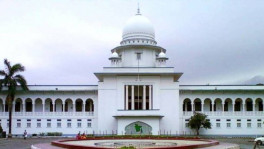Ctg on the brink of become unlivable due to unplanned planning: Civil society leaders
They said the city’s development strategies must be re-evaluated with fresh perspectives, ensuring active participation from both students and the general public

Despite being the second-largest city in Bangladesh, Chattogram has seen unplanned development that has harmed its natural environment without benefiting its citizens, civil society leaders and city planners said yesterday (11 September).
The port city is now on the brink of becoming unlivable, they said at a civil society discussion programme titled "Reconsidering Chattogram in New Dreams and Realities," held at the Chattogram Circuit House.
They said the city's development strategies must be re-evaluated with fresh perspectives, ensuring active participation from both students and the general public,
Delivering the keynote speech at the event, Engineer Subhash Chandra Barua, vice president of the Planned Chattogram Forum, stressed that Bangladesh's economic success relies on sustainable urban development.
"However, due to unplanned development, Chattogram is on the brink of losing its livability. Traffic jams, air pollution, sound pollution, water pollution, canal and river grabbing has made it dangerous for people to live here," he pointed out.
He criticised the ignorance, inefficiency, and corruption of political and governmental figures involved in the failed development projects.
Umama Fatema, coordinator of the Anti-Discrimination Student Movement, emphasised the need to resolve the city's chronic waterlogging, questioning the necessity of large infrastructure projects like flyovers, given their limited public benefit.
Professor Sikandar Khan, vice chancellor of East Delta University, chaired the event organised by Sammilito Nagorik Forum.
Also speaking on the occasion, Amir Uddin from Chittagong University condemned the large-scale corruption in waterlogging projects and criticised the city corporation's inability to provide basic services, despite increasing taxes.
Professor Manjurul Kibria of the university highlighted the city corporation's failure in waste management and urged for environmentally focused infrastructure development, including the eviction of illegal occupiers along the Karnaphuli River.
Tauhidul Islam, CEO of Chattogram City Corporation, acknowledged the absence of a coordinated development plan for the city.
Meanwhile, The Business Standard journalist Shamsuddin Ilyas warned that future water shortages, both industrial and potable, would pose a significant challenge for Chattogram.
He called for collective efforts to protect the Karnaphuli River from pollution and ensure sustainable development.
In his closing remarks, Professor Sikandar Khan called for balanced and sustainable development, warning that previous unsustainable projects had caused environmental and economic harm.


 Keep updated, follow The Business Standard's Google news channel
Keep updated, follow The Business Standard's Google news channel















